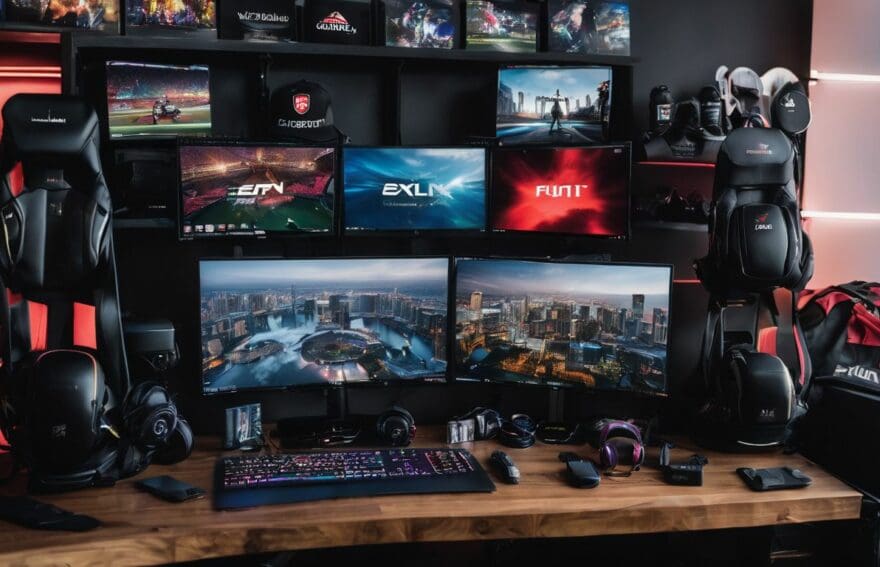Esports Merchandising: A Career in Fan Engagement and Sales

Updated On: October 24, 2025 by James Connolly
Are you eager to carve out your own success in the burgeoning esports merchandising scene? You’re in good company. We’ve delved deep into this vibrant sector that’s growing at breakneck speed, chock-full of potential for creative minds.
Our comprehensive guide brims with astute strategies and insights designed to transform fan fervour into flourishing merchandise ventures. So don your entrepreneurial hat – your thrilling career journey begins with us!
Understanding Esports Marketing
Esports marketing is a rapidly growing industry that focuses on promoting and selling products and experiences within the world of competitive gaming. Marketers leverage the benefits of esports, such as its global audience, to create engaging campaigns through various channels like social media, events, and sponsorships.
Definition of esports
Esports stands for electronic sports, a form of competition using video games. These competitions can range from amateur local tournaments to professional leagues and international championships where players battle it out in popular titles like “League of Legends,” “Fortnite,” or “Counter-Strike.” It’s not just about playing games; esports is an entire industry complete with teams, coaches, analysts, and marketing experts all focused on the growth and success of their brands.
As esports continues to skyrocket in popularity, we see massive audiences tuning into live streams or attending events in arenas around the world. With its rapid expansion comes numerous opportunities for merchandising and fan engagement.
We leverage this excitement by creating exclusive gaming merchandise that helps fans show support for their favourite teams and players while also driving sales and revenue within the burgeoning esports market.
Benefits of esports for marketers
Esports provide marketers with an engaged audience, allowing for targeted engagement and interactive experiences. The industry offers substantial revenue potential through merchandise sales and event sponsorships. Esports marketing allows for strategic audience targeting, leveraging the industry’s incredible growth and extensive fan community. Marketers can create unique and interactive fan experiences, fostering strong brand loyalty and increased revenue generation. Leveraging sponsorships within esports provides opportunities for extensive brand exposure to a passionate and loyal audience. Additionally, the strength of fan identity within esports fandoms predicts high engagement levels, offering marketers a powerful avenue for reaching their target audience.
Types of esports marketing
Understanding the different types of marketing strategies used in esports is crucial for engaging with the passionate audience and driving sales. Here are the key types of esports marketing that provide opportunities for reaching and connecting with fans:
- Influencer Marketing: Leveraging popular gamers and personalities to promote products and engage with their extensive fan base, thereby increasing brand visibility and credibility.
- Branded Content: Creating custom content that seamlessly integrates a sponsor’s product or service into gaming streams or tournaments, allowing for organic exposure to targeted audiences.
- Sponsorship Activation: Collaborating with esports teams or events to showcase a brand in a way that resonates with the fan base, potentially leading to increased recognition and brand loyalty.
- Product Placement: Strategically placing merchandise within gaming environments or streaming content to generate interest and drive sales among the engaged audience.
- Event Sponsorships: Sponsoring esports tournaments, leagues, or teams to gain exposure among the passionate gaming community while also offering exclusive experiences to fans.
Trends in esports marketing
With the growing popularity and influence of esports, trends in marketing continue to evolve. Esports is not just about the games, but also about creating immersive experiences for fans.
Marketers are leveraging augmented reality (AR) and virtual reality (VR) technologies to bring fans closer to their favourite teams and players. Additionally, live streaming platforms have become a crucial part of esports marketing, providing opportunities for real-time engagement with audiences.
The rise of influencer marketing within the esports industry has also seen significant growth, as brands collaborate with popular gamers and personalities to reach wider audiences.
Furthermore, there is an increasing focus on diversity and inclusion in esports marketing strategies, aiming to create a more inclusive environment for all fans.
Esports merchandise sales remain a pivotal trend in fan engagement as it provides fans with tangible connections to their favourite teams and players. Brands are capitalising on this trend by offering exclusive and personalised merchandise that resonate with the diverse fan base found within the esports community while reflecting their personal identities.
Building a Fan Base
Engaging with fans is crucial in the world of esports, and we’ll discuss the importance of fan engagement strategies and how to create unique fan experiences. Don’t miss out on learning more about building a loyal fan base in the exciting industry of esports marketing!
Importance of fan engagement
Fan engagement is a vital component of esports marketing, driving revenue through merchandise sales and creating long-term brand loyalty. This engagement plays a pivotal role in the industry’s rapid growth, offering opportunities for marketers to capitalise on the enthusiastic and financially empowered fan base.
By understanding the significance of engaging with fans, career professionals can effectively target specific demographics and leverage interactive strategies to create unique experiences that drive enthusiasm and sales.
As we delve into effective fan engagement strategies, it becomes evident that this aspect is the lifeblood of successful esports merchandising careers, as it not only fosters a sense of community but also provides substantial revenue streams from merchandise sales.
Understanding these dynamics will be crucial for those seeking a future in this rapidly expanding industry.
Strategies for increasing fan engagement
To increase fan engagement, we can employ various strategies that resonate with passionate gamers and novice gamers alike. Here are some effective ways to enhance fan engagement:
- Host interactive online events and competitions where fans can participate and win exclusive merchandise, creating a sense of community and excitement around the brand. This strategy leverages the trend of interactive engagement within esports fandoms.
- Develop personalised content tailored to different segments of the fan base, focusing on their unique interests and preferences in merchandise and experiences. Personalised content creation is essential for connecting with diverse demographics within the engaged audience.
- Collaborate with influencers and professional players to create engaging content, promotions, and giveaways that appeal to the target audience’s passion for esports merchandise. Leveraging sponsorships in esports plays a key role in enhancing fan engagement through strategic partnerships.
- Offer limited-edition merchandise releases or pre-orders tied to significant events or tournaments, building anticipation among fans and driving sales while fostering a loyal customer base. Exclusive merchandise drives revenue generation by capitalising on fan identity within esports fandoms.
- Implement gamification techniques such as loyalty programs, challenges, and rewards for active community members to incentivise engagement with the brand and foster a sense of belonging within the passionate gamer community. Gamification strategies contribute to increasing repeat purchases from enthusiastic fans.
Importance of creating unique fan experiences
After implementing effective fan engagement strategies, it’s essential to focus on creating unique experiences for esports fans. This includes offering exclusive access to behind-the-scenes content, limited edition merchandise, and opportunities for interactive participation during events.
These tailored experiences not only strengthen the bond between fans and their favourite teams but also contribute to increased brand loyalty and revenue generation. By providing fans with exclusive offerings and immersive interactions, it becomes possible to build a loyal following while capitalising on the purchasing power of engaged esports enthusiasts.
The creation of unique fan experiences can lead to a deeper emotional connection between fans and their favourite esports organisations. Offering one-of-a-kind opportunities such as meet-and-greets with players or exclusive merchandise releases can significantly enhance fan satisfaction while contributing to overall brand elevation within the competitive esports landscape.
Content Creation
Content creation in esports marketing involves creating engaging and shareable content, including live streams, interviews with players, behind-the-scenes footage, and informative videos to connect with fans.
This also includes the importance of storytelling to create a narrative that resonates with the audience and utilising social media platforms for maximum reach.
Types of content used in esports marketing
Esports marketing utilises various types of content to engage and connect with fans. Here are the key types of content used in esports marketing:
- Live Streams: Live streaming of gameplay, tournaments, and behind-the-scenes content provides an interactive experience for fans, allowing them to feel connected and involved in the gaming community.
- Video Content: Engaging video content, such as highlight reels, player interviews, and promotional videos, helps build excitement and interest around esports events and teams.
- Social Media Posts: Regular updates on platforms like Twitter, Instagram, and Facebook keep fans informed about upcoming events, team news, and special promotions, fostering a sense of community.
- Podcasts: Podcasts featuring industry experts, players’ insights, and discussions on esports-related topics offer a deeper understanding of the industry while creating a loyal following among fans.
- Interactive Contests: Contests such as fan art competitions or predictions on tournament outcomes encourage active participation from fans and increase their emotional investment in the esports community.
- Influencer Partnerships: Collaborations with gaming influencers help spread awareness about esports events, teams, and merchandise to a wider audience through authentic endorsements.
- Team Blogs: Insightful blogs written by team members or management provide unique perspectives and behind-the-scenes knowledge that fans find engaging and exclusive.
- Virtual Reality (VR) Experiences: Immersive VR experiences allow fans to virtually attend games or explore virtual environments related to their favourite teams or players.
- Educational Content: Informative content such as tutorials on game strategies or explanations of complex gameplay mechanics caters to both novice gamers seeking knowledge and passionate gamers looking for tips to improve their skills.
- Fan-Generated Content Showcase: Highlighting fan artwork, cosplay photos, or gameplay highlights on official channels fosters a sense of appreciation for fans’ creativity while building a supportive community around the esports brand.
Importance of storytelling
Storytelling plays a pivotal role in esports marketing, creating emotional connections and immersive experiences for fans. By weaving compelling narratives around teams, players, and events, marketers can enhance fan engagement and foster brand loyalty.
Captivating stories resonate with the audience on a deeper level, igniting their passion for the sport and driving merchandise sales.
Engaging narratives bring the esports experience to life, showcasing the human side of the industry and creating relatable content that resonates with fans from all walks of life. Leveraging storytelling as part of an overall marketing strategy enables brands to stand out in this competitive landscape while forging strong connections with both passionate gamers and novice enthusiasts.
Utilising social media platforms
- Utilising social media platforms is crucial for reaching and engaging with the esports audience on a personal level, allowing for direct interaction and building brand loyalty.
- Creating engaging video content: Sharing highlights, behind-the-scenes footage, and player interviews on platforms like YouTube and TikTok can attract and retain the attention of fans.
- Leveraging influencer partnerships: Collaborating with popular streamers and gaming influencers on platforms such as Twitch and Instagram can extend reach and credibility among the gaming community.
- Interactive live streams: Hosting live Q&A sessions, gameplay streams, or product launches on platforms like Facebook Gaming and Discord provides direct interaction opportunities with fans.
- Community engagement through hashtags: Developing unique hashtags to create a sense of community around a team or event across platforms like Twitter and Reddit fosters fan involvement.
- Engaging storytelling through social posts: Using platforms like Twitter and LinkedIn to share compelling narratives about players, teams, or merchandise helps in building emotional connections with the audience.
Event Management in Esports
Event management plays a crucial role in the success of esports marketing. From live tournaments to online events, the experience and engagement of fans are paramount. Merchandising at these events can significantly impact revenue and brand recognition within the esports industry.
Importance of events in esports marketing
Esports events play a crucial role in esports marketing, offering a platform for engaging with fans on a personal level and creating memorable experiences. These events provide opportunities to showcase merchandise, build brand identity, and generate significant revenue through the sale of exclusive items.
With the industry’s rapid growth and vast engaged audience, events serve as essential touchpoints for marketers to directly connect with fans and drive sales. Moreover, leveraging these gatherings allows esports brands to create unique fan experiences that strengthen engagement and loyalty.
The impact of events on esports marketing cannot be overstated when considering the potential for revenue generation from merchandise sales alone. Additionally, events offer marketers the chance to tap into specific demographics within the passionate gaming community while also amplifying brand visibility through live interactions with fans.
Types of esports events
Esports events come in various formats and cater to different types of gaming enthusiasts. Here are some of the prominent types of esports events:
- International Tournaments: These large-scale events bring together the best teams from around the world to compete in popular games, such as League of Legends, Dota 2, and Counter-Strike: Global Offensive.
- Regional Leagues: These events focus on specific regions or countries, allowing local teams to showcase their talent and compete for recognition within their respective gaming communities.
- Exhibition Matches: Often held during gaming conventions or special occasions, exhibition matches feature friendly competitions between well-known players or teams, aiming to entertain and engage fans.
- Online Competitions: With the increasing popularity of online gaming, esports events are frequently hosted virtually, allowing players from across the globe to participate without geographical constraints.
- Collegiate Esports: This type of event involves universities competing against each other in organised esports leagues and tournaments, showcasing the skills of student gamers.
- Pro-Am Tournaments: These events blend professional players with amateur gamers, creating a unique environment where aspiring talent can challenge established professionals.
- Invitational Events: Exclusive tournaments that require an invitation for participation; these events often draw attention due to their limited entry criteria and elite player lineups.
Role of merchandising in event management
Event management in esports plays a vital role in creating unique and engaging experiences for fans. Merchandising is an essential component of event management, offering exclusive merchandise that resonates with the passionate gaming community.
By strategically integrating merchandising into esports events, marketers can capitalise on the enthusiasm of fans, driving both engagement and revenue. The sale of branded merchandise not only strengthens the fan identity but also provides a lucrative avenue for team owners and event organisers to enhance their overall marketing strategy.
Furthermore, exclusive merchandise sales at esports events contribute significantly to the industry’s revenue generation potential while fostering deeper connections between teams and their loyal fan base.
Leveraging merchandising within event management presents an exciting opportunity to create memorable experiences for gamers while boosting brand loyalty. As we delve into career opportunities in esports marketing, understanding the impact of merchandising in event management becomes increasingly crucial.
Career Opportunities in Esports Marketing
There are various job roles in esports marketing such as brand manager, social media manager, event coordinator and content creator, each requiring strong skills in digital marketing, communication and creativity.
If you’re looking to break into the industry and make a career out of engaging with passionate gamers and driving sales through merchandise, read more about the exciting opportunities available in esports marketing.
Job roles in esports marketing
Esports marketing offers various exciting job roles for individuals passionate about engaging with fans and driving sales. Here are some captivating career opportunities within esports marketing:
- Esports Brand Manager: Responsible for developing and managing the overall brand strategy for an esports team or organisation, including sponsorship activations and fan engagement initiatives.
- Content Creator: Tasked with producing engaging and creative content across various platforms, such as social media, to captivate the audience and drive fan engagement.
- Merchandising Specialist: Manages the creation, promotion, and sales of exclusive merchandise, leveraging fan loyalty to drive revenue and strengthen the team’s brand identity.
- Event Coordinator: Plans and executes engaging events such as tournaments, meet-ups, and fan experiences, creating memorable moments that deepen fan connections with the esports brand.
- Sponsorship Manager: Develops and nurtures relationships with potential sponsors to secure partnerships that align with the team’s values and resonate with the fan base.
- Digital Marketing Specialist: Utilises digital channels to reach and engage with target audiences, employing strategies such as email marketing, SEO, and online advertising to promote events and merchandise.
Skills needed for a career in esports marketing
To excel in a career in esports marketing, certain skills are crucial for success. These skills include:
- Proficient knowledge of the gaming industry and esports landscape to understand target audience preferences.
- Strong understanding of marketing principles to create effective strategies for engaging fans and driving sales.
- Excellent communication skills to connect with fans, teams, and sponsors, fostering valuable relationships.
- Creative thinking and problem – solving abilities to develop innovative fan engagement initiatives and merchandise concepts.
- Proficiency in data analysis to track marketing performance and make informed decisions for future campaigns.
- Adaptability and willingness to stay updated on industry trends and technological advancements to remain competitive in the field.
Tips for breaking into the industry
- Broaden your knowledge of the esports industry, including understanding the various games, teams, and players to stay updated with the trends and developments.
- Develop strong networking skills by connecting with professionals in the esports industry, attending events, and engaging in online communities to learn from their experiences.
- Gain practical experience through internships or volunteering opportunities at esports tournaments and events to build a foundation for a career in fan engagement and sales.
- Hone your marketing skills by creating and promoting content related to esports on social media platforms to showcase your abilities and passion for the industry.
- Stay informed about the latest marketing strategies and technologies used in the esports industry, such as audience targeting and revenue generation methods to be well-prepared for a career in this field.
Conclusion
In conclusion, esports merchandising is a dynamic career path that offers abundant opportunities for engaging with fans and driving sales. Marketers in this field can tap into the immense potential of esports to target specific demographics and create interactive experiences.
With the industry’s rapid growth, there is significant revenue potential from merchandise sales, making it an appealing career choice for those passionate about fan engagement and sales.
Engaging fans through exclusive merchandise and leveraging the strength of fan identity are key strategies for success in this exciting and lucrative industry.
FAQs
1. What is Esports merchandising as a career?
Esports merchandising involves sports management skills to enhance fan engagement and drive sales through esports branding, sponsorship, and making sure audience targeting in esports is spot on.
2. How important is teamwork in an Esports merchandising career?
Strong team strategies are essential in sports marketing careers, especially within the esports industry where collaboration can lead to creative merchandise ideas and better fan experiences.
3. Can you make good money with a career in Esports merchandising?
Yes! With revenue generation being key in entertainment management, there’s significant potential for financial success given the growth statistics of the esports industry.
4. Why is Esports sponsorship vital to my role in merchandising?
Sponsorship plays a huge part by providing resources that bolster your efforts in audience engagement and contribute directly to driving up sales figures within the exciting realm of Esports.








